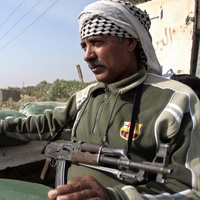 |
 |
| Insurgent | Militant |
The language of war is a precarious area. Quite often there’s significant meaning in the terms being used. For example, in Afghanistan, the U.S. is fighting militants. But in Iraq, the U.S. is fighting insurgents.
On Monday, according to the Associated Press, militants were in the news:
Militants stormed Kabul’s most popular luxury hotel Monday, killing at least six people as they hunted down Westerners who cowered in a gym — a coordinated assault that could signal a new era of brazen Taliban attacks.
Similar language was used in a report from National Public Radio.
Meanwhile, in Iraq this week, according to the New York Times, it was insurgents who rigged a house to kill Americans.
From the alleyway outside a day later, there was little sign that this was the house where the bomb exploded Wednesday, during an offensive to clear Sunni insurgents from the northern Diyala River valley, 60 miles north of Baghdad.
Is there a difference? Radio Free Europe muddies the definitions with a headline story last January, Afghanistan: Are Militants Copying Iraqi Insurgents’ Suicide Tactics?.
The White House, meanwhile, released a fact sheet last week, referring to Shia militants.
But in a speech in the Rose Garden before leaving for the Middle East, President Bush used several terms, except militants.
“First was a surge of additional troops into Iraq, with a new mission to protect the Iraqi people from terrorists, insurgents and illegal militias; second was a surge of operations that began in June once the troops were in place, with new offenses across the country to drive the terrorists and militias out of their strongholds; and third was a surge of provincial reconstruction teams, was a civilian surge, which deployed across Iraq to ensure the military progress was quickly followed up with real improvements in the daily lives of the Iraqi citizens.”
In 2005, a BBC listener pressed Helen Boaden, the director of BBC news on the use of insurgents. She responded:
This term was decided upon because it describes people who are “rising in active revolt”.
It is the best word to use in situations of rebellion or conquest when there is no free-standing government.
That was then — when the BBC implied there’s no free-standing government in Iraq — and this is now. And now, the BBC is using both words in stories coming out of Iraq.
Color me confused. So I submitted the question to AP editor David Minthorn, who is the person who writes and maintains the organization’s style guide. He responded:
Insurgent refers to people and groups actively battling the government or coalition forces. Militant usually refers to members of armed militias, which have a variety of agendas. The Kabul hotel attack is believed to have been carried out by Islamic militants, possibility surrogates of the Taliban insurgency.
Possibly, but the terms are often used when we don’t know who’s responsible for a particular incident. BTW, I submitted the same question to National Public Radio’s ombudsman earlier this week. But she did not respond. She was answering other questions, like “What is an ombudsman.” That I can answer. It’s the person who can explain when and why a news organization uses one carefully chosen word over another.
(Photo credits: Getty Images)
